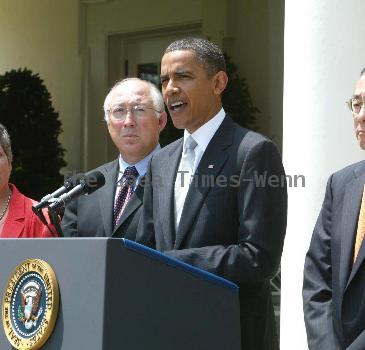APNewsBreak: Pentagon says plan to drill offshore in Va. would interfere with military
By Matthew Barakat, APTuesday, May 18, 2010
APNewsBreak: Va. offshore drilling hits snag
McLEAN, Va. — Most of Virginia’s coastal waters the government wants to use for oil and gas exploration would interfere significantly with military operations, the Defense Department said in yet another major road block for offshore drilling.
The Pentagon report showed that roughly three-fourths of proposed lease site would be completely off limits to oil and gas exploration because it would interfere with training, testing, gunnery exercises and other operations, particularly the Norfolk naval base, the world’s largest. Much of the rest of the tract is already heavily used by commercial ships served by busy ports in Hampton Roads and Baltimore.
Rep. Jim Moran, an opponent of offshore drilling, wrote a letter Tuesday to Virginia Gov. Bob McDonnell, urging him to back off on his push for offshore drilling.
“I trust you would agree that the presence of the Department of Defense in the Commonwealth is of greater benefit than anything that could be derived from offshore drilling,” Moran wrote.
In March, President Barack Obama lifted a ban on offshore drilling in the Atlantic, and Virginia was poised to become the first Atlantic state to allow such drilling. A lease of the roughly 4,500 square-mile tract about 50 miles off the shoreline had been slated for 2012.
But after the massive oil spill in the Gulf of Mexico, the Minerals Management Service postponed public hearings on the Virginia lease sale.
The report could be even more crippling. The Pentagon cannot unilaterally veto drilling proposals, but Dorothy Robyn, deputy under secretary of defense for installations and environment, said the Defense and Interior departments have a long history of cooperation, and drilling has never taken place in an area objected to by the military.
“We have every expectation that if we said we need an area … that they would fully honor that,” Robyn said.
Moran said by telephone that he knew that the drilling plan would significantly affect Naval operations, but even he was surprised that so much of the territory would need to be off limits.
“It’s conclusive that you can’t have both. You have to choose one or the other. It’s either the Navy or it’s offshore drilling,” Moran said. “I can’t imagine the governor would jeopardize the operations of the Navy in the Hampton Roads area in order to pursue” offshore drilling.
McDonnell spokeswoman Stacey Johnson said in a statement the governor was confident that offshore energy production and the military can coexist in Virginia.
In recent weeks, McDonnell has continued to support offshore drilling while calling for a thorough investigation of the Gulf spill. In March, McDonnell suggested that the Virginia tract should be expanded, which could potentially allow oil companies to more effectively work around any military restrictions.
The Pentagon for years has consulted with the Interior Department on potential areas of concern for offshore drilling. The most recent report, completed roughly two months ago and not previously made public until Tuesday, reflected an effort by the Pentagon to take a more nuanced approach.
For instance, on the eastern Gulf coast, the Pentagon report said that exploration could occur on certain tracts if certain conditions were met. In previous reviews, those tracts would simply have been declared off limits, Robyn said.
Nicolette Nye, spokeswoman for an industry trade group the National Ocean Industries Association, said it’s possible that a contractor could work around the military restrictions.
“This depends on where the resources are located. Resources may or may not be in the areas that DOD is expressing concern with,” Nye said in an e-mail.
Tags: Barack Obama, Energy, Mclean, North America, Oil spill, United States, Virginia

